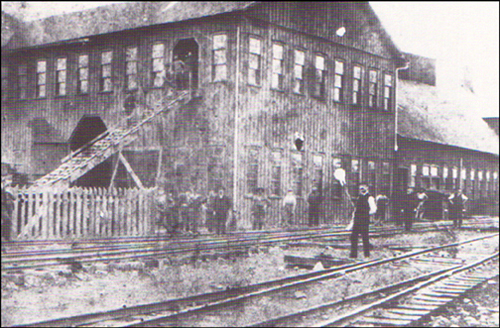Johnson City once boasted of having two prominent and competing foundries. The Johnson City Foundry and Machine Works, Inc. (1883-1987) operated at 920 W. Walnut Street, the Inter-State Foundry and Machine Company (1924-early 1980s) at 343 Love Street. Ironically, the same two founders started both businesses.

In 1963, JCF&MWI had the distinction of being the oldest industrial plant still operating in Johnson City. That year the company celebrated its 80thanniversary of the original company and the 17thanniversary of the new one. Its principal officers (and positions) were George H. McDowell (President-Treasurer), May A. Ross (later McDowell, Vice-President and Secretary), J. Frank Lamons (Sales Manager), R.O. Wood, Jr. (Chief Draftsman), Sabe W. Hawkins (Office Manager), Robert F. McNeil (Plant Superintendent), Willard McInturff (Foreman of Structural Steel Department), M. Guy Lane (Foreman of Ornamental and Light Steel Department), Vernon Eads (Foreman of the Foundry and Pattern Shop) and Gilbert Ingle (Foreman of the Machine Shop).
A foundry is defined as a business where metal is melted and poured into molds. The new venture formed in 1883 was initially known as the Miller and Crumley Foundry. It was situated on the tracks of the East Tennessee, Virginia and Georgia Railroad (later the Southern Railway). The Ash Street Courthouse would later occupy the site. Over years, the business would carry three names: Johnson City Foundry and Machine Works, Johnson City Foundry and Machine Company and Johnson City Foundry and Machine Works, Inc.
The next year, Colonel Thomas E. Matson purchased the Miller and Crumley Foundry and converted it into a large store and hollowware (hollow metal utensils) plant. Colonel Columbus Powell of Knoxville became a partner with Matson and the plant was incorporated with a capital of $20,000. Matson served as president.
The company erected two buildings at the junction of the ETV&G and ET&WNC railroads. One was a 5000 square foot two-story structure, the other a 12,500 one-story one. Matson acquired machinery for them from a firm in Philadelphia. Beginning in 1885, the Foundry repaired and rebuilt locomotives for the “Tweetsie” Railroad and specialized in custom ironwork.
In 1907, the plant was rebuilt on the western half of its Walnut Street property in order to make room for the expansion of the Clinchfield Railroad. The plant consisted of a machine shop, a foundry and a blacksmith shop. They provided service and repairs for the “Tweetsie” Railroad, which had just completed construction of a railroad line from Cranberry, North Carolina to Johnson City, Tennessee.
In 1914, the company faced a foreclosure crisis. Glen Setzer, a former machinist who received his apprenticeship at the plant and completed his training on the Southern Railway in Bristol, became manager of the organization. He successfully ran the Foundry until his death in 1935, when the job befell his widow.
The Foundry was a jobbing plant, meaning its products were mostly made to specific customer orders. The one exception was the standard veneer slicing machine used in the lumber and furniture manufacturing industries. George Sitton, an early plant manager, developed the device that initially bore the name, the Sitton Slicer. It later became known as the Johnson City Slicer after several improvements were made to it.
The business was always geared up to accepting new challenges to sustain or acquire new customers. That was never more important than when customers began asking for products fabricated from aluminum, a lighter metal. The company’s responsiveness to change helped keep the foundry in operation throughout its long history. As early as 1943, the Aluminum Company of America became the Foundry's largest customer and continued to be so until the 1970s.
During World War II, the Johnson City Foundry became one of the nation's leading producers of military equipment and hardware. The company received the “Distinguished Army-Navy E Award” in 1943 as recognition for impressive production achievements.
In March 1946, Mr. George McDowell became the company’s president and treasurer. Mrs. McDowell was vice-president and general counsel. She was a sister of Mrs. Setzer and had worked at the company before becoming an attorney. George offered a concise explanation of the nature of their work by saying, “If it's made of iron or steel, draw a picture of it and we'll build it. As a matter of fact, you can now add brass or aluminum to that list.”
According to McDowell, the reason the plant was able to operate for such a long time without specific products was because of the diversification of its manufacturing facilities and its highly skilled workforce, which enabled the plant to continue even during hard times.
Fierce competition and a profit squeeze made it essential that each department become sufficient in its operations. The constant improvement of facilities was another important factor in its success. The Company increased its plate storage and added cranes to improve the handling of metal products. It enlarged the Ornamental Shop, added several new machines and rearranged all departments for better flow of raw materials and final products.
JCF&MWI continued to expand under the leadership of the McDowells, filling a wide range of regional business and construction needs. It fabricated steel for small building projects and large construction jobs, such as 750 tons of steel supplied to East Tennessee State College for the building of Memorial Gymnasium. With the advent of aluminum manufacturing, the Foundry began moving away from cast iron and steel production.
During the early 1980s, the company soon fell prey to declining demands for aluminum castings, inflation and a gradual shrinking of the coal industry to which the the company was a major supplier. In 1984, a Knoxville firm, Tenetek, bought the business, but it faced foreclosure in 1987. When the end finally came, approximately 133 employees from Tennessee, Virginia, and North Carolina were left without employment.
The Johnson City Foundry and Machine Works, Inc. had a 104-year successful reign in Johnson City.

Comments are closed.